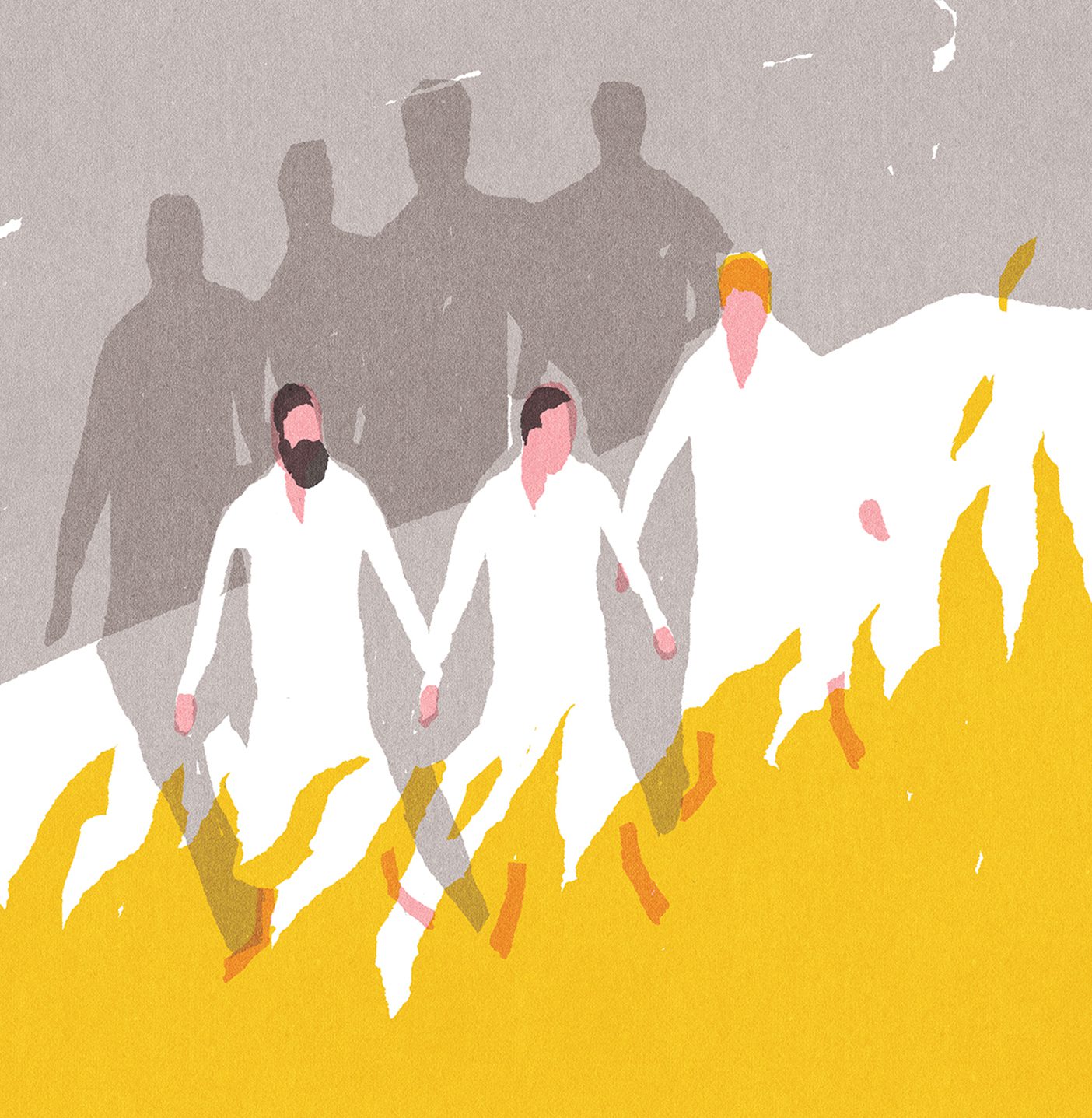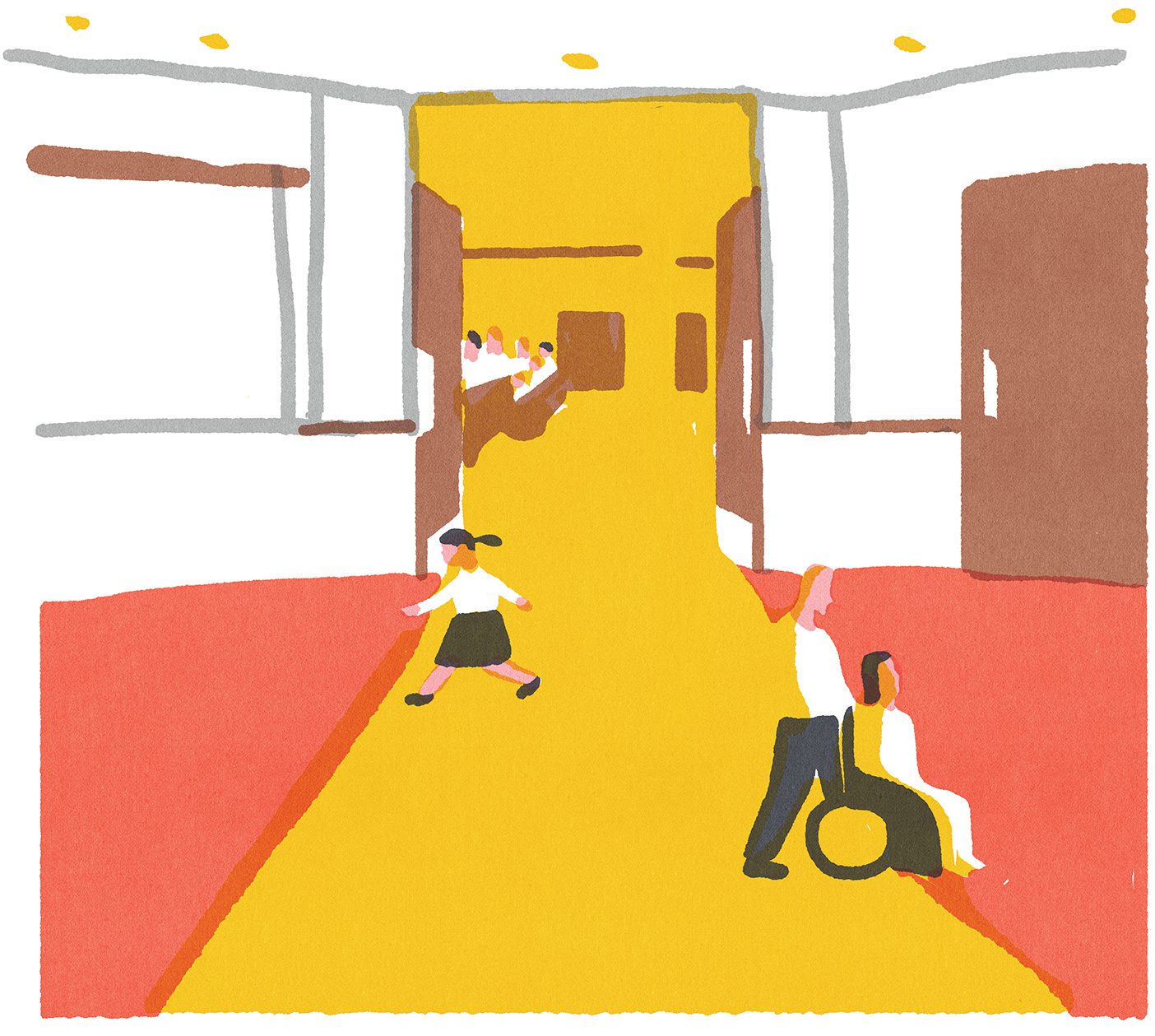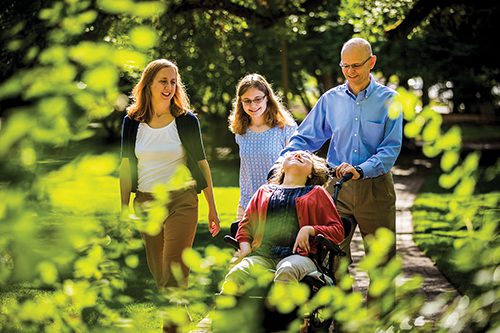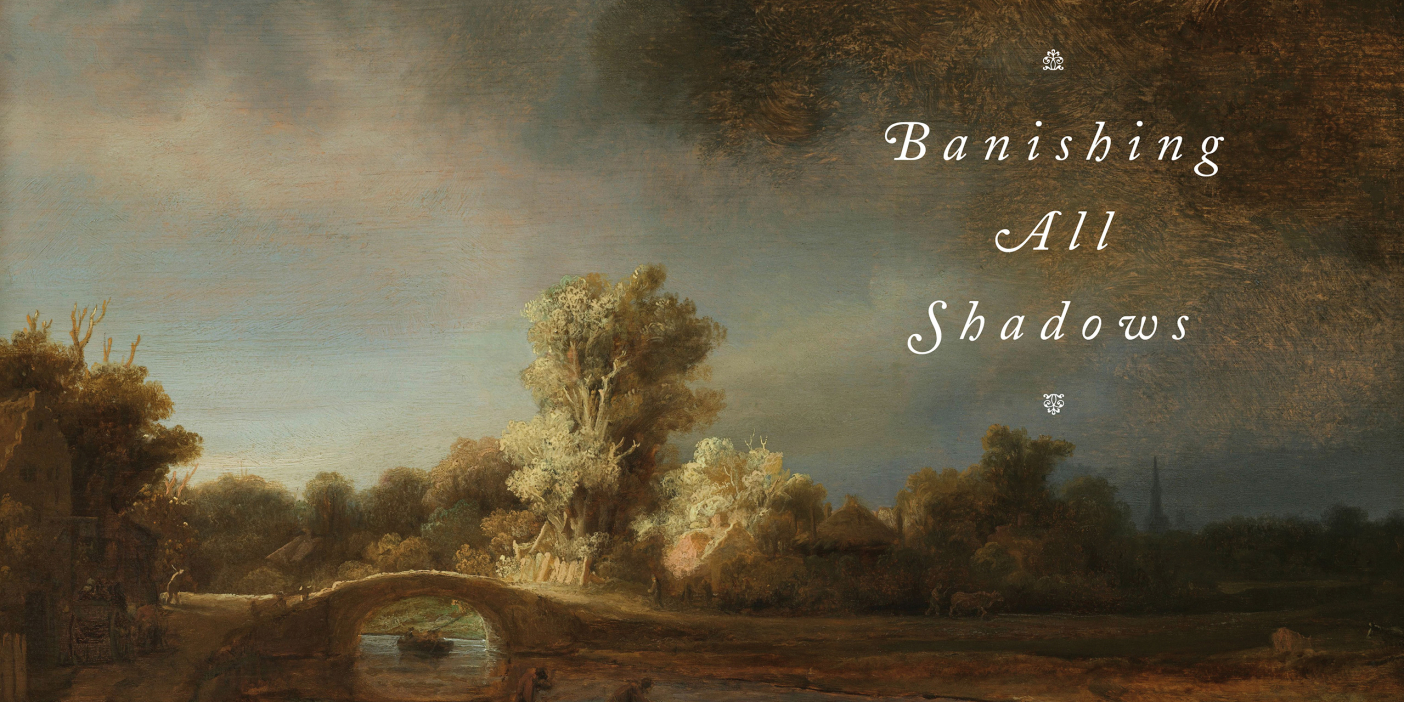“Thy Troubles to Bless”

Even during dark days when questions go unanswered, we can find joy and faith.
By Jeffrey S. McClellan (BA ’94) in the Winter 2019 Issue
Illustrations by Lorenzo Gritti
Dark clouds filled the Provo sky on April 15, 2003, the due date for our second daughter. My wife, Christine, was concerned that she had not felt the baby move for a day or so. She had an urgent feeling that we needed to go to the hospital for a test. I thought she was being overly cautious.
I remember our cheerful nurse at the hospital that morning, chatting away as she hooked Christine up to monitors and quickly found a heartbeat. All was well.
With the monitor running, the nurse left the three of us—Christine, 1-year-old Lizzy, and me—talking pleasantly in the room.
Suddenly something changed. The reassuring, regular beep of the heart monitor stopped. We called for the cheerful nurse, who assured us that this happens—babies move or monitors slip. It would just take a second to find the heartbeat. I remember the nurse’s face as she searched for the heartbeat, her smile fading, her eyes becoming serious. Still searching. She called for another nurse to try. No, she couldn’t find it either. Oh, there it was. Wait—no, that was Christine’s heartbeat.
And then there was a sudden rush of nurses into the room. There were calls for doctors and hurried explanations. I sat in the corner, holding Lizzy on my lap, watching with a growing, helpless dread. Emergency C-section, they said, and they rushed out the door with my wife.
Lizzy and I retreated to the hallway, where, in a few minutes, a cart sped by with a too-white, too-still, too-quiet baby on it. Was that our baby? It wasn’t clear. In a room behind windows, doctors painstakingly inserted an IV through the tiny umbilical cord. Yes, I was told, that is your baby—not breathing, faint heartbeat, lost a lot of blood. Mother is fine.
The baby—Caroline, we would call her—was placed on a gurney and prepped for a helicopter ride to Primary Children’s Medical Center.
My father had arrived. We slipped our hands beneath the plastic shield that covered my little girl and placed them on her tiny head with its dark, wispy hair. In the name of Jesus Christ and by His priesthood, I blessed her to have a strong heart and lungs; I blessed her to have a full recovery.
Then Caroline was whisked out the door to the waiting helicopter, Lizzy went home with my parents, Christine stayed at the hospital to recover, and I drove to Salt Lake City, chasing the helicopter. I felt the sudden fragmentation of our family—each of my girls now in someone else’s care and me driving alone through the rain.
Over the next hours and days there were a lot of tests and questions, a lot of indefinite answers and tearful conversations. Family members and friends joined their faith with ours in earnest fasting and prayer.
Gratefully, Caroline lived. In some ways the blessing I pronounced that day was fulfilled directly. She has a healthy heart and strong lungs. She did not, however, fully recover as I had stated in the blessing. Her loss of blood—still unexplained—meant she had experienced a lack of oxygen to her brain, which suffered severe damage.
Fifteen years later, Caroline is stuck at about a 3-month-old developmental level. She cannot walk or crawl or roll over. She cannot talk. Her eyes and ears function, but it is unclear how much she can process of what she sees or hears. She has frequent seizure-like tremors, eats through a tube in her stomach, receives a special diet supplemented by a variety of medications, and sees an assortment of doctors. Sometimes—frequently—Caroline becomes sad. She will cry and cry, and neither we nor the doctors can determine what is wrong. We just have to wait it out—and pray.
The good news is that Caroline is adorable. She has the biggest smile and the greatest laugh. She loves hugs and kisses, a cold wind on her face, and the rumble strips on the freeway. Caroline likes to hear our voices, and we like to hear hers. She makes cute, soft “aah” sounds and really loud “AAH” sounds—often in the middle of the night. She enjoys our regular gatherings in her room for morning devotional or for singing and praying before bed. She smiles big when we sing, “[We’re] so glad when daddy comes home,”¹ which we sing every day.
We love Caroline. We are so grateful she is part of our family, and I appreciate how she has shaped my life. But I wish things were different. I wish she could run and sing and argue with her sister. I am often sad for her, because her life is hard. I worry that she may be uncomfortable or in pain or bored or scared, and we don’t know how to help.
We still have dark days and long nights and unanswered questions. We also have love and joy—and hope.
But a life like Caroline’s raises questions of faith. Why was she not healed according to that first priesthood blessing? How does God let such a precious, innocent child suffer?
Perhaps you have similar questions. We all have circumstances that try our faith—times when, despite faithful living and earnest pleading, things don’t go according to the plan of happiness we envision or the divine promises we expect. You may struggle with a persistent mental illness or chronic pain. Maybe you fight a stubborn addiction. Your grief may be lingering singleness or disheartening infertility. You may feel weighed down by unemployment, temptation, or the death of someone you love. You may pray ceaselessly for someone who has lost faith, or perhaps you wrestle with your own doubts.
Whatever the trial may be, we all endure seasons of distress that test the limits of our faith—afflictions that may cause us to question whether what we believe can still be true in the face of such overwhelming obstacles to belief. We may feel downtrodden and defeated, confused and crumbling. We may feel that God is distant and that we are hanging by an ever-so-thin thread of faith over a gaping chasm of despair. These are “the deep waters” of our lives, when we feel “the rivers of sorrow” threatening to overflow upon us.²
In periods of such extremity, how do we—how do you—sustain faith?
On Jesus, Lean for Repose
A few days before Caroline’s dramatic entrance into this world, Christine and I read a talk given by Elder Lance B. Wickman in the October 2002 general conference. It was a moving, thought-provoking talk, though it seemed somewhat removed from us at the time.
A few days after Caroline’s birth, we read Elder Wickman’s talk again, now finding it directly relevant.
Elder and Sister Wickman had lost a young son to a childhood illness, despite many prayers and a powerful priesthood blessing. They also, we later learned, have a disabled daughter.
To those who face similar tests of faith, Elder Wickman said:
As to the healing of the sick, [the Lord] has clearly said: “And again, it shall come to pass that he that hath faith in me to be healed, and is not appointed unto death, shall be healed” (D&C 42:48; emphasis added). All too often we overlook the qualifying phrase “and is not appointed unto death” (“or,” we might add, “unto sickness or handicap”). Please do not despair when fervent prayers have been offered and priesthood blessings performed and your loved one makes no improvement or even passes from mortality. Take comfort in the knowledge that you did everything you could. . . . The Lord—who inspires the blessings and who hears every earnest prayer—called him home nonetheless.³
At the end of his talk, Elder Wickman shared three seldom-sung verses from “How Firm a Foundation.” Since then, this has become my favorite hymn. The final verse says this:
The soul that on Jesus hath leaned for repose
I will not, I cannot, desert to his foes;
That soul, though all hell should endeavor to shake, . . .
I’ll never, no never, no never forsake!
After Caroline’s birth, we felt exquisitely the need for a firm foundation of faith, as it seemed that all hell was endeavoring to shake us. We were—and are—learning to lean, oh so heavily, on Jesus for repose.
Two years ago we were preparing for Caroline’s second year at Young Women camp. Christine had rented a private cabin near the camp so she could have a clean place for feeding and diaper changing and so Caroline could be loud in the middle of the night. A few days before camp, however, Caroline got sad—really sad. We knew we were likely in for a hard week.
Our home teachers and I gave Caroline a priesthood blessing, and within hours she started to calm down. Caroline and Christine had a wonderful, rejuvenating week at camp. It was a girls-camp miracle, a profound evidence to us of the power of the priesthood and of God’s love and mercy.

A year later Christine, again, prepared to take Caroline to camp, and, again, Caroline got sad. A day before they left, I had a strong spiritual impression that I should give Caroline a blessing—and that I should not wait. Without even telling Christine, I immediately gave Caroline a brief priesthood blessing. Then I waited for the miracle.
Caroline was still sad when she and Christine left for camp, and she stayed sad. She was miserable, and after a couple of days, Christine and Caroline left early to come home, where Caroline remained sad.
We have had many such experiences with Caroline—blessings that have been obviously fulfilled contrasted with blessings that seem to have fallen to the ground unnoticed.
For years I struggled with how to have faith when giving blessings or praying for heavenly help. When all depends on God’s will and when God’s will seems unknowable or mysterious, how do I have faith that my petition will be granted? What do I have confidence in when I lack confidence in knowing God’s will?
Then I realized that we are not commanded to have faith in blessings but in the Giver of blessings. And the first principle of the gospel is “faith in the Lord Jesus Christ,” not faith in a charmed life free from trouble (A of F 1:4, emphasis added).
God does not expect me to pray for Caroline with faith that she will be healed; He invites me to pray for her with faith in Him, who is her Eternal Father and mine and who will, in His infinite wisdom, do what is best, though it may cause her and me—and Him—temporary anguish of soul. God takes the long view, and our ultimate good may mean short-term pain, confusion, or heartache.
In the midst of our adversity, it may be tempting to think that God has not fulfilled His promises. But we do not lean for repose on desired outcomes. As the song says, we lean for repose on Jesus, who will not desert us to our foes, though all hell may shake around us.
Shadrach, Meshach, and Abed-nego exemplified this trust in God when they refused to worship Nebuchadnezzar’s golden idol. Even threatened with the king’s fury and fire, they defiantly declared, “Our God whom we serve is able to deliver us from the burning fiery furnace. . . . But if not, be it known unto thee, O king, that we will not serve thy gods” (Dan. 3:17–18, emphasis added).
“These three did not place their faith in blessings but in the Giver of blessings. Their trust in God was not dependent on deliverance.”
“But if not”—Shadrach, Meshach, and Abed-nego did not place their faith in blessings but in the Giver of blessings. Their trust in God was not dependent on deliverance from the fiery furnace; therefore, they could go forward confidently, knowing that anything could happen and they would still be secure in Christ.
These faithful friends were cast into the fiery furnace before there was deliverance, and there were not three but four men in the flames, “and the form of the fourth [was] like the Son of God” (Dan. 3:25).
In the midst of their fiery trial, these three men communed with the Son of God. Such a sacred companionship in times of trouble can be our blessing as well:
For I will be with thee, thy troubles to bless, . . .
And sanctify to thee thy deepest distress.⁴
“Thy Gold to Refine”
When Caroline was 5, she had a stretch of waking between 2 and 3 a.m. for many nights in a row. One night after this unwelcome wake-up call, I wrote this:
Once you see Caroline—even at 2 a.m.—it’s hard to maintain your frustration. . . . She smiles big when you lift her out of the bean bag she sleeps in, looking around curiously with those big, innocent eyes. . . . As I was changing her diaper just now, I was absentmindedly singing one of the [Primary] songs that Lizzy has declared we shall now sing for bedtime every night. . . .
“God gave us families to help us become what He wants us to be.” And I looked at Caroline and suddenly the words came to the forefront of my consciousness, an unexpected intersection between poetry and the reality of my life in that moment. God gave me a family—including this 2 a.m. waker—to help me become what He wants me to be. . . . “This is how He shares His love,” the chorus continues, “for the fam’ly is of God.” ⁵
That night I felt a brief, blessed communion with God, a confirmation that He was, in that moment, personally aware of me and Caroline and our family. And He, my Father, gave me encouragement by teaching me why we face such challenges.
Because God loves us, He gives us experiences “to help us become what He wants us to be,” and He designed this fallen world—with all its imperfections and fiery trials—to accomplish that purpose. As the hymn says:
When through fiery trials thy pathway shall lie,
My grace, all sufficient, shall be thy supply.
The flame shall not hurt thee; I only design . . .
Thy dross to consume and thy gold to refine.⁶
I am moved by the story of the father who brought to the Savior his son “which hath a dumb spirit . . . [that] teareth him: and he foameth, and gnasheth with his teeth” (Mark 9:17–18; see also verses 17–27).
Jesus told the father that all things are possible with faith (see Mark 9:23).
And “the father of the child cried out, and said with tears, Lord, I believe; help thou mine unbelief” (Mark 9:24).
It may be tempting to look on this father’s faith as weak or incomplete. But in my own extremity, I feel keenly that father’s wrestle with belief, and I admire his determined, humble declaration of imperfect faith.
“Jesus Christ’s grace is amazing; Whatever your infirmity or sorrow or fiery trial of faith, “[His] grace, all sufficient, shall be thy supply.””
If faith were a simple, clear knowledge, it would not be so inspiring. This father’s faith in seeking a blessing was powerful precisely because his faith was less than perfect. Despite uncertainty, despite years of desperate parental prayers that seemed to go unanswered, despite a failed blessing by the disciples—despite all of that, this father still sought from the Son of God the blessing he most desired. He chose to believe.
Imperfect faith is still faith. By very definition, faith is incomplete (see Alma 32:17–18, 21), so if you feel you lack clarity and a sure knowledge, that is okay. That is faith. Be patient with the imperfection of your faith. The incompleteness gives faith its power.
Faith is a courageous, optimistic response to the ambiguity and adversity of this world. Faith is a choice to believe based on an incomplete and ever-changing body of data. Faith is saying, “Even though I am in pain, even though I am confused, even though I don’t hear God’s voice clearly, I still choose to believe. I will wait on the Lord.”
Patience is hard, especially when we find the waters deep and the night dark. But remember what Moroni said: “Ye receive no witness until after the trial of your faith” (Ether 12:6, emphasis added). The “after” means we must wait.
“My Grace, All Sufficient”
Caroline is often sad and loud at church—or sometimes happy but still loud—and Christine or Lizzy or I, or a kind ward member, will take her out to the foyer of the chapel, where we push Caroline around in her chair, calming her with the movement.
In the foyer we are joined by various people coming late to the meeting, chasing small children in and out of the chapel, or just enjoying the softer seats. I have felt a sense of community in the foyer—a kinship with these others who, like us, find their situation not quite measuring up to the chapel ideal. I have also felt the Spirit in the foyer as I have walked figure eights with my daughter, and I have been impressed with this simple thought: the gospel is still true in the foyer.
We all spend time in the foyer, figuratively speaking. We each face circumstances that make us feel on the margins of the congregation. And that is okay, because the gospel is still true in the foyer.
One Sunday a couple of years ago, I came to church pushing an especially sad Caroline, thinking we might just stay for the sacrament. As I walked the foyer and Caroline remained sad, I began to wonder if we would even make it until the sacrament. All my efforts to comfort her seemed fruitless.

But then the sacrament hymn began and Caroline calmed briefly when I started to sing. She quickly got fussy again, so I put my face close to hers and I sang to her. She quieted and listened. The sacrament hymn that day was “Reverently and Meekly Now,” which was written in the first-person voice, as if the Savior were singing. Admittedly, I was focused on Caroline and not on the song—until we came to the fourth verse, when I found myself singing these words to my daughter:
I have loved thee as thy friend,
With a love that cannot end.⁷
I looked into Caroline’s big blue eyes and felt deeply the tender, personal truth of those words for my daughter. Jesus Christ, the Redeemer of the world, loves Caroline “with a love that cannot end.” Even there in the foyer, in her less-than-ideal state, Caroline is loved. When she is sad or hurting, when her parents are clueless and incapable of comforting her, there is One who is her Everlasting Friend, who knows how she feels and how to succor her.
The corollary is also true. Jesus is my friend, and He is yours. He knows my frailties—including my frailties of faith—and He knows yours. And He loves us not in spite of those frailties but with a full, compassionate understanding of them (see Mosiah 15:5–9). He loves us in our crucible of spirit because He has felt what we feel—our doubt and discouragement as well as our sin and sorrow.
I have sometimes thought that Jesus must have suffered for us in one great cosmic mass of suffering. But recently I have come to feel that He likely suffered for each of us in an individual, intimate way, one by one (see 3 Ne. 11:13–17; 3 Ne. 17:9, 21). He felt my specific sins and sorrows, He endured Caroline’s particular afflictions and anguish, and He experienced your individual infirmities and imperfections.⁸ And because He did, He knows how to help (see Alma 7:11–12), “in ev’ry condition.”⁹ In the words of the hymn, “As thy days may demand, so thy succor shall be.”¹⁰
That is why His grace is called amazing. It includes all people, which means you. It includes all time, which means now. It includes all pain, which means yours. The gospel tent is big enough for all of us, with all of our different difficulties, because Jesus Christ’s Atonement is both infinite and intimate.
“We each face circumstances that make us feel on the margins of the congregation. And that is okay, because the gospel is still true in the foyer.”
In the foyer our tribulations provide a workshop for the amazing grace of Jesus Christ. In the foyer we face travail and distress that cause our very hearts to break and our spirits to become contrite. And in the foyer the Master Healer takes our broken hearts and gives each of us a new heart, His heart, which was broken—and then made whole—for us.
Recently our family was having a lighthearted discussion about a momentous topic: my lack of hair. I asserted that after the Resurrection, they won’t even recognize me with my curly locks.
Without a pause, Lizzy said, “I think we will be too distracted by Caroline talking.”
We all laughed, but I was struck by the profound truth in her words: The salvation available through our Great Redeemer is all-inclusive, encompassing my hair and Caroline’s brain damage and everything in between. Jesus Christ’s grace is amazing; His power to heal knows no bounds. Whatever your infirmity or sorrow or fiery trial of faith, “[His] grace, all sufficient, shall be thy supply.”¹¹
Christine, Lizzy, and I share a firm foundation of faith in that truth, which has brought infinite reservoirs of hope to our lives. We know—and we testify—that Caroline’s eternal identity is not defined by her mortal disability; a beautiful and glorious future awaits her because of Jesus Christ, who is also her friend and companion in her present distress.
The same is true for you. Because of Him, we all have hope for everlasting redemption, and because of Him, we all have help in earthly anguish. So hold on. Trust on. Hope on. God loves you.
Fear not, I am with thee; oh, be not dismayed
For I am thy God and will still give thee aid.
I’ll strengthen thee, help thee, and cause thee to stand, . . .
Upheld by my righteous, omnipotent hand.¹²

This article is adapted from a devotional address on July 10, 2018, by Jeffrey S. McClellan, director of BYU Publications & Graphics. (Pictured: Christine, Lizzy, Caroline, and Jeff McClellan; photo by Nate Edwards.) The full text, audio, and video can be found at speeches.byu.edu.
Send comments on this article to magazine@byu.edu.
NOTES
- “Daddy’s Homecoming,” Children’s Songbook, 210.
- “How Firm a Foundation,” Hymns, 2002, no. 85, verse 4.
- Lance B. Wickman, “But If Not,” Ensign, November 2002; emphasis in original.
- “How Firm,” verse 4.
- Quoting Matthew Neeley, “The Family Is of God,” Friend, October 2008.
- “How Firm,” verse 5.
- “Reverently and Meekly Now,” Hymns, 2002, no. 185, verse 4.
- See Merrill J. Bateman, “One by One,” BYU devotional address, Sept. 9, 1997.
- “How Firm,” verse 2.
- “How Firm,” verse 2.
- “How Firm,” verse 5.
- “How Firm,” verse 3.




